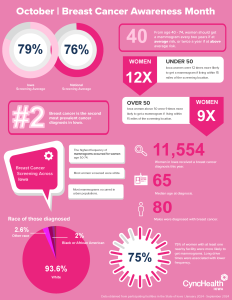Every October, the world turns pink. Different fundraisers are held, ribbons appear on labels, and social media fills with reminders of breast cancer awareness. It is a powerful month, no doubt about that, but for many, breast cancer is not confined to just one month; it is an everyday reality.
Almost eight years ago, my mom was diagnosed with breast cancer. I was nine years old and did not quite understand the severity of the diagnosis. Our lives quickly shifted into a new rhythm full of doctors’ appointments, wigs, and seeing my mom ill. She was always the strongest person in my life, and suddenly, I saw her succumb to such a terrible disease. And yet, she endured.
She fought through rounds of treatment, side effects, and multiple surgeries. Today, she is in remission, nearly seven years free of the disease. However, the memory of that battle remains with me, and it shapes how I view October.
Breast cancer is one of the most common cancers in the world, with more than 316,000 new cases of invasive breast cancer expected in the U.S. in 2025 alone (National Breast Cancer Foundation). And while the numbers are staggering, progress has been equally powerful. Survival rates have steadily improved—today, the five-year survival rate for invasive breast cancer is about 91 percent, and if the disease is caught early, that number climbs to 99 percent. Since 1989, breast cancer death rates have fallen by 44 percent, thanks to earlier detection, better screenings, and advances in treatment (Breast Cancer Research Foundation).
Without these advancements in research, many loved ones would not be here today. There are now more than four million women in the United States living with a history of breast cancer, whether still in treatment or long past it (BreastCancer.org). My mom is one of them. Her story is part of that growing number of survivors who are living proof that research, funding, and awareness matter.

But even in remission, breast cancer never completely disappears from our lives. Follow-up appointments remain, the anxiety of each test result lingers, and the memories of those hardest days never fully fade. For families like mine, breast cancer awareness doesn’t last thirty-one days. It is woven into our lives every month, every year, long after the pink ribbons are packed away.
That is why October should be more than just a month. It should be a reminder to keep the momentum going all year long, encouraging screenings, funding research, supporting survivors, and pushing for equity in outcomes. While my mom’s story is one of survival, not every family has the same ending. Awareness beyond October is how we close that gap.
For me, pink will never just be a color. It is for my mom, friends, grandparents, aunts, and even the men in our lives, too. Unfortunately, as young people, there is no sure way to prevent breast cancer. While you can always try to live a healthy lifestyle and eat well, genetics are still a large factor in cancer, meaning it is not preventable.
My mom’s remission is a gift, one I will never take for granted. But it also comes with responsibility; the responsibility to remember that behind every statistic is someone else’s mom, sister, daughter, or friend. And their fight deserves our attention not just in October, but every single day.
If this article is relatable to you, I know it is hard, I know it is unfair, and I know it feels like the world is against you. When my mom was sick, it was difficult for me to talk about it because no one knew what it felt like. I was in fourth grade. I was supposed to be worried about playing on the playground and what book I had to write a book report on. Instead, I was worried about my mom and my family. It is not fair, and no one can ever tell you it is. But I promise, there are people out there who relate. It is okay to be vulnerable; it is okay to be scared. It will get better. But don’t give up, don’t ever give up.
If you want to make a difference, even a small donation or conversation can help save lives. Here are a few organizations that continue the fight year-round:
https://www.bcrf.org/other-ways-give/
https://www.cancer.org/donate.html
https://standuptocancer.org/
https://www.v.org/how-to-help/ways-to-give/